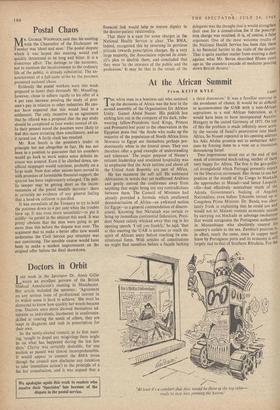Doctors in Orbit
AST week in the Spectator Dr. Annis Gillie Lawrote an excellent preview of the British Medical Association's meeting in Manchester. Her article included the sentence: 'Agreement on any serious issue of professional interest in its widest sense is hard to achieve.' She must be dismayed to know how quickly her wards became true. Doctors once more showed themselves ad- mirable as individuals, incoherent in conference. skilled at treating the needs of others, they are inept in diagnosis and rash in prescription for their own.
So the newly-elected council, at its first meet- ing, 'sought to dispel any misgivings there might be on what has happened during the last few days.' Clarity was certainly desirable, for one motion as passed was almost incomprehensible. It would appear to commit the BMA (even though the council now disclaims any intention to take 'immediate action') to the principle of a fee for consultation, and it was argued that a financial link would help to restore dignity to the doctor-patient relationship.
That there is a case for some charges in the National Health Service is clear. The BMA, indeed, recognised this by reversing its previous attitude towards prescription charges. By a very large majority, the Association rejected its coun- cil's plea to abolish them, and concluded that they were 'in the interests of the public and the profession.' It may be that in the minds of the
delegates was the thought that it would strengthen their case for a consultation fee if the prescr tion charge was retained. It is, of course, a false argument. One of the most welcome results of the National Health Service has been that the re is no financial barrier to the visits of the doctor. That is quite another matter from erecting a dam against what Mr. Bevan described fifteen years ago as 'the ceaseless cascade of medicine pouring down British throats.' .














































 Previous page
Previous page